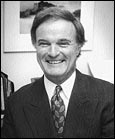Royal Appointment
Sweden's King Tapped Dean for Environmental Post
By Alice K. Boatwright, UC Berkeley Extension
Posted September 1, 1999
 Berkeley Extension Dean Garry Brewer was the King Carl XVI Gustaf Professor of Environmental Science for 1998-99. Peg Skorpinski photo. |
"When a king calls, you just don't say no," said Brewer, who had become acquainted with the king through his work as a board member for Sweden's National Foundation for Strategic Environmental Research, also known as MISTRA.
"Of course, I was also honored and delighted."
The named professorship was established in 1996 as a 50th birthday gift to the king, in recognition of his support for environmental efforts in Sweden. It gives a distinguished foreign scholar the opportunity to spend time at a Swedish university or college, with the aim of stimulating Swedish research in environmental science.
"In Sweden, both the king and the country are very interested in the environment," said Brewer. "In 1993, MISTRA was created with a $325 million national commitment which has since grown to $700 million.
"Considering there are only eight and a half million Swedes, on a per capita basis, this is equivalent to the United States committing 20 billion dollars to environmental research."
In addition, the Swedes are leaders internationally in developing research designed specifically to solve environmental problems.
At the time he received the king's invitation, Brewer was dean of the School of Natural Resources and Environment at the University of Michigan. After agreeing to go to Sweden, he was also tapped for the position of dean at UC Berkeley Extension. He arrived here last fall.
"It was an embarrassment of riches," said Brewer, "but I couldn't say no to either. The opportunity to return to Berkeley -- my alma mater -- and head up one of the premier continuing education programs in the country was too appealing. As an educator, I know that education today no longer stops at 21, the same way I know, as an environmentalist, that environmental problems respect no national boundaries."
As king's professor, Brewer helped launch the School of Environmental Management at the Royal Institute of Technology in Stockholm. He also had access to all of the universities and colleges in the country and traveled around Sweden giving lectures and speeches on his specialties -- interdisciplinary theory and the joining of business with environmental problem solving. During his tenure, he was elected to membership in the Royal Swedish Academy, and, in November, in a gala ceremony at Stockholm City Hall, he gave the acceptance address for all of Sweden's new professors. Perhaps the high point of the year came in January when Brewer and his wife were invited to the Royal Palace for dinner with the king and queen.
His principal project tied in with his work at Berkeley, where he is not only dean of Extension, but a professor with the Energy and Resources Group.
Collaborating with colleagues in Europe and the United States, he has developed the Alliance for Environmental Management, which links programs at the Royal Institute and Berkeley with similar programs at Yale, the University of Michigan, the Department of Energy Technology in Zurich and the Technical University of Vienna.
As part of the alliance, students will take four core courses via distance learning, giving them access to the top professors internationally in their field. The online learning will be supplemented with guidance by local faculty. To add to their global understanding of the field, students will also spend a year studying at one of the other schools in the alliance. All of the institutions currently offer master's degrees. A few students will also be invited to continue on in a doctoral program.
"If we want to achieve environmental protection," said Brewer, "we have to train future scholars and professionals to think way beyond the confines of their basic disciplines and attain a much broader perspective."
![]()
![]()
September 1 - 7, 1999 (Volume 28, Number 4)
Copyright 1999, The Regents of the University of California.
Produced and maintained by the Office of Public Affairs at UC Berkeley.
Comments? E-mail berkeleyan@pa.urel.berkeley.edu.